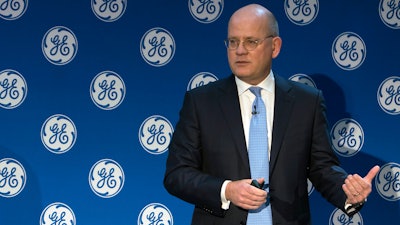
NEW YORK (AP) — General Electric slashed its dividend in half and will attempt to vastly narrow its focus to three key sectors — aviation, health care and energy — as the conglomerate with early ties to Thomas Edison considers shedding even its historic lighting business.
The company also pulled back on profit expectations Monday and shares slumped 7.2 percent, their biggest one-day loss since the financial crisis was roiling the stock market in early 2009.
New Chairman and CEO John Flannery said the company is weighing the future of its transportation, industrial, and lighting businesses so that it can focus more intently on its most profitable divisions.
GE's quarterly dividend is being cut to 12 cents to bring payouts to shareholders closer in line with the amount of money that the company is bringing in. According to S&P Global, GE will save $4 billion a year.
Flannery, speaking at GE's investor meeting in New York, said 2018 will be a "reset" year, and projected a profit of between $1 and $1.07 a share. That's well below the $1.15 a share analysts expected, according to FactSet. GE also forecast weaker cash flows than analysts had projected.
Last month Flannery said that GE would shed business units worth more than $20 billion over the next year or two. It has been paring businesses for well over a decade now. He has been tasked with reviving growth and says the cost-cutting moves are intended to make GE simpler and stronger.
GE lost $1.47, or 7.2 percent, to $19.02. The stock hadn't fallen that much in one day since March 30, 2009. It's down 40 percent this year and trading at five-year lows.
General Electric also said it may distance itself from Baker Hughes, the oil and gas giant of which it bought a majority stake earlier this year. Flannery said the integration of Baker Hughes into GE's business is going well, but the company seeks to lessen its exposure to volatile energy prices.
"The first 100 days maybe didn't go exactly as I was expecting," said Flannery, who became CEO in August.
Baker Hughes fell $1.07, or 3.2 percent, to $31.88.
After a weak third quarter, Flannery said last month that GE was planning major cost cuts across the board and that it would exit some businesses. The company has already surpassed its goal of cutting $1 billion in industrial costs this year, and plans more than $2 billion in cuts next year.
That is double the original target, to go with at least $20 billion in divestments over the next year or two, Flannery said.
The company's board is shrinking as well, Flannery said, from 18 members, to 12.
There will be three new directors with relevant industry experience, annual elections for board members, and a term limit of 15 years. Board changes will be in effect by April.
Last month GE said two of its vice chairs will leave at the end of the year as the company continued to announce changes at the top after the end of Jeffrey Immelt's 16-year run. The company also replaced its chief financial officer.
In terms of the amount paid to investors, the dividend cut is one of the largest in U.S. corporate history. S&P Global said the largest ever was also made by GE: the company axed $8.9 billion in annual spending in early 2009 when it cut its dividend in response to the global financial crisis. That reduced GE's quarterly payments to 10 cents from 31 cents.






















